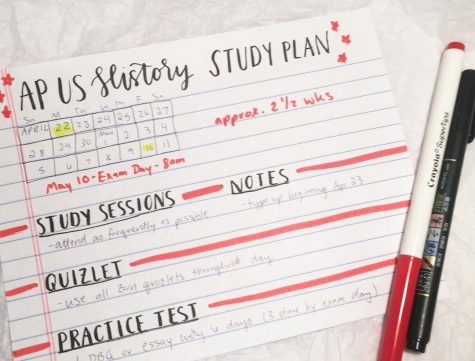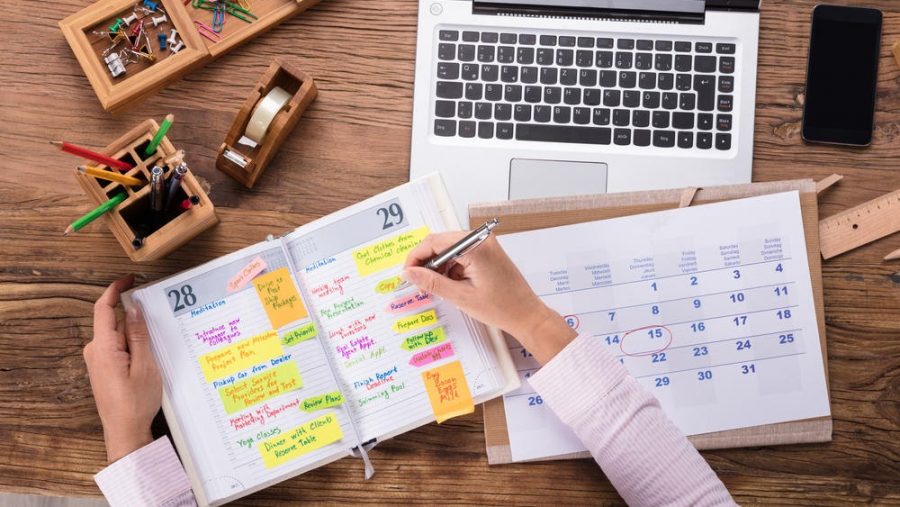Feeling Stressed About AP Exams? These Tips Could Help You on Your Path to a 5!
Apr 17, 2021
As you look over the pages and pages of notes, PowerPoint presentations, and old tests and quizzes, you may find it difficult to even know where to begin studying for your upcoming AP exams. However, these tips can help ease your stress and help you use your time wisely while preparing. Even if you are not taking an AP class this year, these tips may be helpful for any future tests.
The best tip to get a great score on your AP exam is to start now! Cramming a year’s worth of facts the days before an exam will not only stress you out, but it will also not help you remember the information as well.
 Once you decide that you are ready to start studying, make a study plan. To begin, write out when you know you can study, even if it is only for 20 minutes. Although you don’t have to follow this schedule exactly, it will help you use your time wisely. Then, write out everything you want to do for that time. This could include reviewing old tests and quizzes, studying vocabulary terms from each unit, reviewing difficult material, and more, but make sure you are specific in your plan. If you can’t remember the main information from each unit, you can use https://apcentral.collegeboard.org/courses to find the Course and Exam Description for each AP class you are taking. Although this document is usually quite long, it may help you remember the key points from each unit so you can begin studying this material.
Once you decide that you are ready to start studying, make a study plan. To begin, write out when you know you can study, even if it is only for 20 minutes. Although you don’t have to follow this schedule exactly, it will help you use your time wisely. Then, write out everything you want to do for that time. This could include reviewing old tests and quizzes, studying vocabulary terms from each unit, reviewing difficult material, and more, but make sure you are specific in your plan. If you can’t remember the main information from each unit, you can use https://apcentral.collegeboard.org/courses to find the Course and Exam Description for each AP class you are taking. Although this document is usually quite long, it may help you remember the key points from each unit so you can begin studying this material.
While creating your study plan, here are a few different techniques to help you prepare:
-
Instead of rereading your notes, use retrieval practice with flashcards or even covering up the answer. Try to think critically about the information instead of memorizing definitions because many test questions will not ask directly for the definition.
-
Shuffle up your work. If you repeat the same tasks, you will focus less because you know what is coming next. For instance, if you are using flashcards in the same order, you won’t learn as much as shuffled flashcards that mix multiple topics. Most tests do not go in chronological order, so you should not let your brain fall into a routine and lose interest in the material.
-
Take many practice tests. One study even showed that students who took several practice tests a few weeks before their final exam scored on average a full letter grade above students who did not. You can find practice tests in your textbook, online, or by asking your teacher.
-
To aid in recall, create mnemonic devices and tricks to memorize challenging information. If you want to understand a concept better, create pictures, graphs, and other visuals that can help you remember.
-
Write out the information rather than typing it, especially when quizzing yourself. Everyone has probably heard teachers explain the importance of muscle memory, so make sure you incorporate this skill in your study plan.
 After you decide how you want to study, follow these tips to gain the most from each study session:
After you decide how you want to study, follow these tips to gain the most from each study session:
-
Try the Pomodoro technique if you have many different tasks to complete in a block of time. This technique involves setting a timer for about 20 to 30 minutes and studying diligently, then taking a 5 minute break between tasks. You can also try to study with others by quizzing each other or talking through challenging concepts.
-
Take breaks!
-
Prioritize exercise. It helps your brain process information faster and relax before diving back into your work.
-
Don’t be afraid of making mistakes! You can learn from them, and they are actually crucial to learning, as long as you correct yourself.
-
Review before you fall asleep. Scientific studies have determined that our brains process information better and store it in long-term memory when we review before going to bed.
In the end, just remember that you are trying your best! Confidence is extremely important when going into an exam, and you have spent all year preparing for these AP exams. Test scores do not define you, nor will they determine your entire future. Prioritize sleep and utilize mental health tips like listening to music, exercising, or socializing, and don’t be afraid to ask for help!




